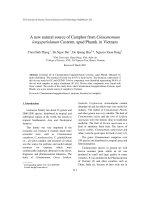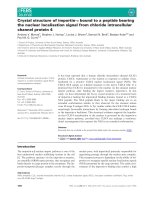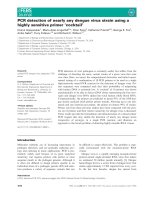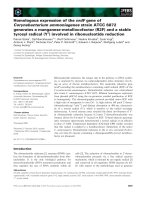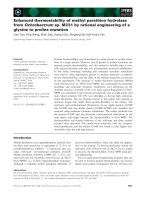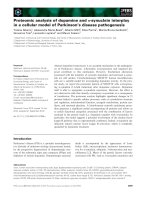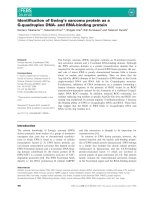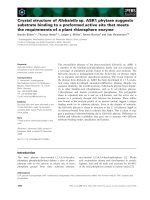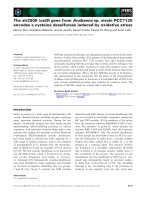Tài liệu Báo cáo " A new natural source of Camphor from Cinnamomum longepetiolatum Costerm. apud Phamh. in Vietnam " doc
Bạn đang xem bản rút gọn của tài liệu. Xem và tải ngay bản đầy đủ của tài liệu tại đây (112.77 KB, 4 trang )
VNU Journal of Science, Natural Sciences and Technology 24 (2008) 211-213
211
A new natural source of Camphor from Cinnamomum
longepetiolatum Costerm. apud Phamh. in Vietnam
Tran Dinh Thang
1
, Do Ngoc Dai
1
, Do Quang Huy
2,
*, Nguyen Xuan Dung
2
1
Vinh University, Hung Dung, Vinh, Nghe An
2
College of Science, VNU, 334 Nguyen Trai, Hanoi, Vietnam
Received 5 March 2007
Abstract. Essential oil of Cinnamomum longepetiolatum Costerm. apud Phamh. Obtained by
hydro distillation. The essential oil yield was 0.91% in fresh leaves. The chemical composition of
this oil was study by GC and GC/MS. Twelve compounds were identified representing 98.8% of
this oil with camphor as major constituent (87.5%). Eleven other compounds were found with
lower content. The results of this study shows that Cinnamomum longepetiolatum Costerm. apud
Phamh. was a new natural source of camphor in Vietnam.
Keywords: Cinnamomum longepetiolatum, Lauraceae, Essential oil, camphor.
1. Introduction
∗
∗∗
∗
Lauraceae farmily has about 45 genera and
2000-2500 species, distributed in tropical and
subtropical regions of the world, but mostly in
tropical Southeastern Asia and Neotropical
America.
This family was very important in the
economic use, because it contains much more
economic trees, such as Cinnamomum
camphora, C. parthenoxylon, C. glanduliferum
etc., all yield camphor and essential oil which
was the source for perfume and useful natural
resources for terpenes which were
commercially important chemicals in the flavor,
fragrances and pharmaceutical industries. The
fruits of Cinnamomum, Litsea, Lindera,
_______
∗
Corresponding author. Tel.: 84-4-8583905.
E-mail:
Syndiclis, Cryptocarya, Actinodaphne contain
abundant oil and fat which ware very useful for
industry. The timber of Cinnamomum Phoebe
and other genera was very valuable. The bark of
Cinnamomum cassia and the root of Lindera
aggregata were the famous drug in traditional
medicine. The fruit of Persea americana is a
kind of nutritious fresh fruit. The leaves of
Laurus nobilis, Cinnamomum subavenium and
others were the good spice for food or can [1,2].
The genus Cinnamomum comprises over
250 species and distributed in tropical areas and
both hemisphere.
Cinnamomum species in general are well
known aromatic plant which an oil was
produced in small and large quality in many
countries. It was included in the Pharmacopoeia
of Vietnam [3] and other countries such as
China, India etc, because of their wide use in
T.D. Thang et al. / VNU Journal of Science, Natural Sciences and Technology 24 (2008) 211-213
212
perfumery, in food industry, in traditional
medicine, in health care etc.
To our best knowledge, no previous
phytochemical works have been recorded for
the C. longepetiolatum Costerm. apud Phamh.
found in Vietnam.
As a part of the research on the essential
oils of Medicinal and Aromatic plants of the
Vietnam flora, especially in the course of
systematic study of Lauraceae in Vietnam, we
reported herein on the chemical constituents of
the essential oils obtained by hydro distillation
of the leaves of C. longepetiolatum.
2. Experimental
1. Source- Cinnamomum longepetiolatum
Costerm. apud Phamh. was a shrub tree up to 5-
8
m
high, growing in Vietnam. Leaves collected
from Nghean province in December 2006. A
voucher specimen (DD109) was deposited at
the Herbarium of the Institute of Ecology and
Biological Resources, Vietnamese Academy of
Science an Technology, Hanoi, Vietnam.
Fresh leaves were shredded and their oil
was obtained by steam distillation for 3h at
normal pressure, according to the Vietnamese
Pharmacopoeia [3]. The yield of the fresh leaf
oil is 0.91%.
2. GC- About 15mg of essential oil, which
was dried with anhydrous sodium sulfate, was
dissolved in 1ml of n-hexane for spectroscopy
or chromatography analysis.
GC analysis was performed on a Agilent
Technologies HP 6890 Plus Gas
chromatography equipped with a FID and fitted
with HP-5MS column (L = 30m, ID = 0.25mm,
film thickness = 0.25 µm), carrier gas H
2
,
injector temperature (PTV) 250
o
C, detector
temperature 260
o
C, column temperature
programmed 60
o
C, 2 min, 4
o
C/min, 220
o
C, 10 min.
3. GC/MS- A Agilent Technologies HP
6890 N Plus Gas Chromatography equipped
with a mass spectrometer HP5973 MSD was
fitted with a fused silica capillary column HP-
5MS column (L = 30m, ID = 0.25mm, film
thickness = 0.25 µm). The analytical condition
were the same as described above with He as
carrier gas, and interface temperature 260
o
C.
Components identification was carried out by
comparing MS data with those reported in
Library Willey on Chemstation HP [4-9].
3. Results and discussion
Table 1 shows the compounds detected in
the leaf oil of Cinnamomum longepetiolatum
representing 98.8% of the total components
separated.
The essential oil was dominated by
camphor (87.5%), with lesser amounts of α-
pinene (2.7%), camphene (2.3%), myrcene
(1.2%), β-pinene (1.2%), limonene (2.3%),
borneole (0.4%), α-humulene (0.3%), α-
phellandrene (0.2%), α-terpinolene (0.3%), α-
terpineol (0.2%), and p-cymene (0.2%).
Table1. Chemical composition of the leaf oil of
Cinnamomum longepetiolatum Consterm. apud
Phamh. in Vietnam
Compounds KI Amount (%)
1
α-pinene
939 2.7
2 Camphene 953 2.3
3
β-pinene
980 1.2
4 myrcene 990 1.2
5
α-phellandrene
1006 0.2
6 p-cymene 1028 0.2
7 Limonene 1032 2.3
8
α-terpinolene
1090 0.3
9 camphor 1145 87.5
10 borneol 1167 0.4
11
α-terpineol
1191 0.2
12
α-humulene
1454 0.3
T.D. Thang et al. / VNU Journal of Science, Natural Sciences and Technology 24 (2008) 211-213
213
The monoterpene hydrocarbons contains
about 8.0%, sesquiterpene hydrocarbon
contains only 0.3%, oxygenated compounds
was very high, around 88%. These compounds
contribute to the camphorous odor of this oil,
which was shows that this species was a new
natural source of camphor.
To the best of our knowledge, this was the
first report on the chemical composition of the
leaf oil of Cinnamomum longepetiolatum
Consterm. apud Phamh. in Vietnam.
Acknowledgements
The Authors wish to thank Assoc. Prof. Dr.
Vu Xuan Phuong, Institute of Ecology and
Biological Resources, Vietnamese Academy of
Science and Technology for plant identification,
Dr. Lawrence N.M. for reading and providing
us papers on Cinnamomum oils. This work was
partially supported by the National Project for
Basic Research from the Ministry of Science
and Technology of Vietnam.
References
[1] P. Hoang Ho, Flora in Vietnam, Montreal Pub,
1992.
[2] Flora of China Editorial Committee, eds. In
Preparation. Flora of China. Vol. 7
(Berberidaceae through Capparaceae). Science
Press, Beijing, and Missouri Botanical Garden
Press, St. Louis.
[3] Vietnamese Pharmacopoeia, Medical Publishing
House, Hanoi, 1997.
[4] S.R. Hell, G.W.A. Milne, EPA/NIH Mass
Spectral Data Base, U.S. Government Printing
Office, Washington D.C., 1978, 1980, 1983.
[5] E. Stenhagen, A. Abrahamsson, F.W. McLafferty,
Registry of Mass Spectral Data, Wiley, New
York, 1974.
[6] A.A. Swigar, R.M. Siverstein, Monoterpenens,
Aldrich, Milwaukee, 1981.
[7] R.P. Adams, Identification of Essential Oil
Components bay Gas Chromatography/
Quadrupole Mass Spectrometry. Allured
Publising Corp.Carol Stream, IL., 2001.
[8] D. Joulain, W.A. Koenig, The Atlas of Spectral
Data of Sesquiterpene Hydrocarbons. E. B.
Verlag, Hamburg., 1998.
[9] N. Anh Dung, T. Dinh Thang, H. Van Luu,
N. Xuan Dung, Volatile Constituents of the Leaf
Oil of Alchornea tiliifolia (Benth.) Muell.
(Family Euphorbiaceae) from Vietnam, Journal
of Essential Oil Research (accepted), 2007.
Một nguồn Camphor tự nhiên mới từ loài
Cinnamomum longepetiolatum Costerm. apud Phamh.
ở Việt Nam
Trần ðình Thắng
1
, ðỗ Ngọc ðại
1
, ðỗ Quang Huy
2
, Nguyễn Xuân Dũng
2
1
ðại học Vinh, Hưng Dũng, Vinh, Nghệ An
2
Trường ðại học Khoa học Tự Nhiên, ðHQGHN, 334 Nguyễn Trãi, Hà Nội, Việt Nam
Cây có tên khoa học là Cinnamomum longepetiolatum Costerm. apud Phamh. và tinh dầu của nó
ñã nhận ñược bằng kỹ thuật chưng cất lôi cuốn hơi nước. Hàm lượng tinh dầu trong lá tươi là 0,91%.
Thành phần hoá học của tinh dầu này ñược nghiên cứu bằng phương pháp sắc ký khí và sắc ký khí
khối phổ. 12 chất, chiếm 98,8% trong tinh dầu ñã ñược xác ñịnh, trong ñó camphor là chất chính,
chiếm tới 87.5%. 11 chất khác ñược tìm thấy với hàm lượng thấp hơn. Các kết quả của nghiên cứu này
ñã chỉ ra rằng loài Cinnamomum longepetiolatum Costerm. apud Phamh. là nguồn cung cấp camphor
tự nhiên mới ñược tìm thấy ở Việt Nam.
T.D. Thang et al. / VNU Journal of Science, Natural Sciences and Technology 24 (2008) 211-213
45
